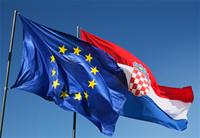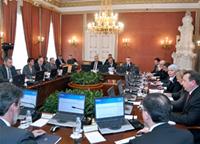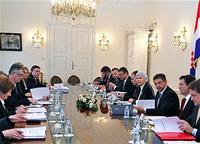Croatia faces snap elections?
Dessislava Dimitrova, March 15, 2011
 Snap elections in Croatia may not remain just a demand of the opposition following a meeting between the leaders of the main political parties in the country on Friday (March 10), called by president Ivo Josipovic. According to the official information, the talks were to be held between 9 a.m. and 5 p.m. local time, but no details about the aim of the meeting were given. According to some local media, however, Josipovic and the party leaders were to discuss a possible date for early elections in the country.
Snap elections in Croatia may not remain just a demand of the opposition following a meeting between the leaders of the main political parties in the country on Friday (March 10), called by president Ivo Josipovic. According to the official information, the talks were to be held between 9 a.m. and 5 p.m. local time, but no details about the aim of the meeting were given. According to some local media, however, Josipovic and the party leaders were to discuss a possible date for early elections in the country.
“President Ivo Josipovic and the leaders of all parties, represented in Parliament, will try to reach a compromise on tackling the political and social shocks ahead of the European Union decision to officially announce the end of accession negotiations with Croatia in June,” local website tportal.hr reported, quoting sources with the president’s office.
By the end of last week this information could be found only in the tportal.hr  website, while none of the other media denied it. According to Josipovic himself the aim of the meeting was to be “the stability, which the state cannot function without”. It was explained from the president’s office that “the opposition has called for snap elections, while the government keeps on insisting that it will complete the EU talks by end-June. The president wants to reach a compromise, which according to him could be elections not to be held before June, in order to see whether the government would be able to bring the EU negotiations to an end”.
website, while none of the other media denied it. According to Josipovic himself the aim of the meeting was to be “the stability, which the state cannot function without”. It was explained from the president’s office that “the opposition has called for snap elections, while the government keeps on insisting that it will complete the EU talks by end-June. The president wants to reach a compromise, which according to him could be elections not to be held before June, in order to see whether the government would be able to bring the EU negotiations to an end”.
According to tportal.hr, despite the reports that Josipovic was going to set an elections date for end-June, this was not likely to happen before the European Commission presented its official opinion on ending the negotiation process. Besides, under the Constitution, the president cannot call elections when the government still has the support of Parliament. It is expected that in June there will be another meeting at which it is possible an election date to be set and most probably it will be for the end of the summer, when the tourist season in the country is over.
 Earlier last week, Josipovic announced that the best option for Croatia was snap elections to be called before the referendum on the country’s accession in the EU. Local media see Josipovic’s position as a clear-cut support for the opposition and for the protesters. Kosor’s government, which has to go through the most difficult part of the negotiation process, has been reiterating that it was working for the stability of the country and for the successful end of EU membership talks, as well as that the recent protests should not be used in order to shake the political stability in the country.
Earlier last week, Josipovic announced that the best option for Croatia was snap elections to be called before the referendum on the country’s accession in the EU. Local media see Josipovic’s position as a clear-cut support for the opposition and for the protesters. Kosor’s government, which has to go through the most difficult part of the negotiation process, has been reiterating that it was working for the stability of the country and for the successful end of EU membership talks, as well as that the recent protests should not be used in order to shake the political stability in the country.
Commenting on Josipovic’s proposal early elections to be held before the referendum, Prime Minister Jadranka Kosor said earlier that the president should not take any sides, nor to lead the opposition. She also said that once the EU talks were over, the ruling coalition would set an election date and that the ruling party was ready for a discussion with the opposition, as it was not afraid of the elections results.
 Bakir Izetbegovic, Andrej Plenkovic | © Council of the EU
Bakir Izetbegovic, Andrej Plenkovic | © Council of the EU Aleksandar Vucic, Recep Tayyip Erdogan | © Serbian Presidency
Aleksandar Vucic, Recep Tayyip Erdogan | © Serbian Presidency Jean-Claude Juncker, Zoran Zaev | © European Commission
Jean-Claude Juncker, Zoran Zaev | © European Commission